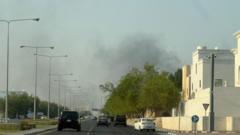What Did a Witness Experience During Qatar's Shocking Strikes?

Published: 2025-09-10 14:49:07 | Category: technology
In a dramatic escalation of tensions between Israel and Hamas, a recent strike in Doha has raised critical questions about the future of Middle East diplomacy and the limits of Israel's military operations. The attack, which reportedly targeted key Hamas figures, has shattered previous assumptions regarding Israel's operational boundaries, particularly in a country like Qatar, traditionally viewed as a haven for Hamas leadership. This incident not only complicates the ongoing conflict but also threatens to destabilise diplomatic relationships in the region.
Last updated: 07 October 2023 (BST)
Key Takeaways
- The Israeli strike in Doha has violated long-held assumptions about the operational limits of Israel's military actions.
- Hamas claims the attack was aimed at its leadership, specifically Khalil al-Hayya, who is reportedly critically injured.
- Qatar has condemned the strike as “state terrorism” and expressed anger towards the United States for insufficient warning.
- The attack raises significant concerns about future negotiations and potential retaliatory actions from Hamas.
- Local reactions in Doha reflect a growing fear and uncertainty among residents regarding their safety.
Context of the Attack
Historically, Qatar has played a pivotal role as a mediator in the Israel-Hamas conflict, offering a base for political discussions and negotiations. The recent Israeli strike, codenamed "Judgement Day," has fundamentally altered the landscape of this delicate balance. It signals a shift in Israel's strategy, potentially allowing for operations beyond its borders, a move that could have far-reaching implications for regional stability.
What Happened During the Attack?
The attack aimed at a meeting of Hamas leaders, reportedly including Khalil al-Hayya, who has been a key figure in the organisation's negotiations. Eyewitness accounts described a scene of chaos, with loud explosions and panic among residents. A witness, who preferred to remain anonymous, recounted the terrifying experience, stating, "The noise was so loud my heart was pumping. I thought the world was going to end." This sentiment reflects the general atmosphere of fear and uncertainty that has enveloped the neighbourhood since the strike.
The Implications for Hamas
Although Hamas claims that its leadership survived the attack, the loss of key personnel, including al-Hayya's son and three bodyguards, raises significant questions about the organisation's future. The implications of this loss could hinder Hamas's ability to negotiate effectively, particularly regarding any US-led peace proposals. The ongoing conflict is further complicated by the uncertainty surrounding al-Hayya's condition, with conflicting reports about his injuries and whereabouts.
Reactions from Qatar and the Wider Region
Qatar's response to the Israeli strike has been one of outrage. Prime Minister Mohammed Al Thani publicly condemned the attack as "state terrorism," highlighting the lack of prior warning from the US. This incident has strained relationships, especially considering Qatar's status as a significant ally of the United States and a host to American military forces. The timing and execution of the attack have raised eyebrows, and officials are calling for accountability and a reassessment of US-Israeli actions in the region.
The US Role and Responsibility
The United States has historically supported Israel's right to defend itself; however, the recent events have led to scrutiny of its role as a peace broker. The Qatari Prime Minister's remarks about receiving a warning merely ten minutes after the attack indicates a potential breakdown in communication between the two allies. This could lead to a reassessment of Qatar's role in facilitating dialogue between the US, Israel, and Hamas in the future.
The Path Forward: What’s Next?
As the dust settles from the attack, the future of Middle East diplomacy remains uncertain. The immediate aftermath has left many questioning the viability of ceasefire agreements and the potential for renewed violence. Israel's escalation of military operations raises the stakes, suggesting that Hamas may feel compelled to respond, possibly with further attacks or retaliatory measures.
Potential for Escalation
The fear among residents in Doha and the wider implications for regional security cannot be overstated. With Hamas reportedly on high alert following the attack, there is a real concern that further actions could spiral into a broader conflict. The precarious balance of power in the Middle East hangs in the balance, with both sides now likely recalibrating their strategies in light of recent events.
Conclusion: The Fragility of Peace
The situation in Doha reflects the fragile nature of peace in the Middle East. With Israel’s military actions crossing previously established red lines, the potential for escalation into broader conflict grows. As regional powers react and recalibrate their strategies, the stakes continue to rise. The world watches closely as the dynamics unfold, with the hope for lasting peace becoming ever more tenuous. How will Israel's actions influence Hamas's response, and what impact will that have on future negotiations? The answers remain uncertain, but the implications are profound.
#Israel #Hamas #MiddleEastPeace
FAQs
What was the target of the Israeli strike in Doha?
The Israeli strike reportedly targeted Hamas leadership, specifically aiming at Khalil al-Hayya, a key negotiator for the organisation.
How did Qatar respond to the Israeli attack?
Qatar condemned the attack as "state terrorism" and expressed anger towards the US for not providing prior warning before the strike.
What are the potential consequences of this attack for Hamas?
The attack has resulted in the deaths of key Hamas figures, complicating their ability to negotiate and potentially leading to retaliatory actions against Israel.
What does this incident mean for US-Israel relations?
This incident may strain US-Israel relations, particularly due to Qatar's criticism of the US for failing to communicate adequately about the attack.
Is there a risk of escalation in the conflict following this attack?
Yes, there is a significant risk of escalation, as Hamas may feel compelled to retaliate, which could lead to increased violence in the region.



